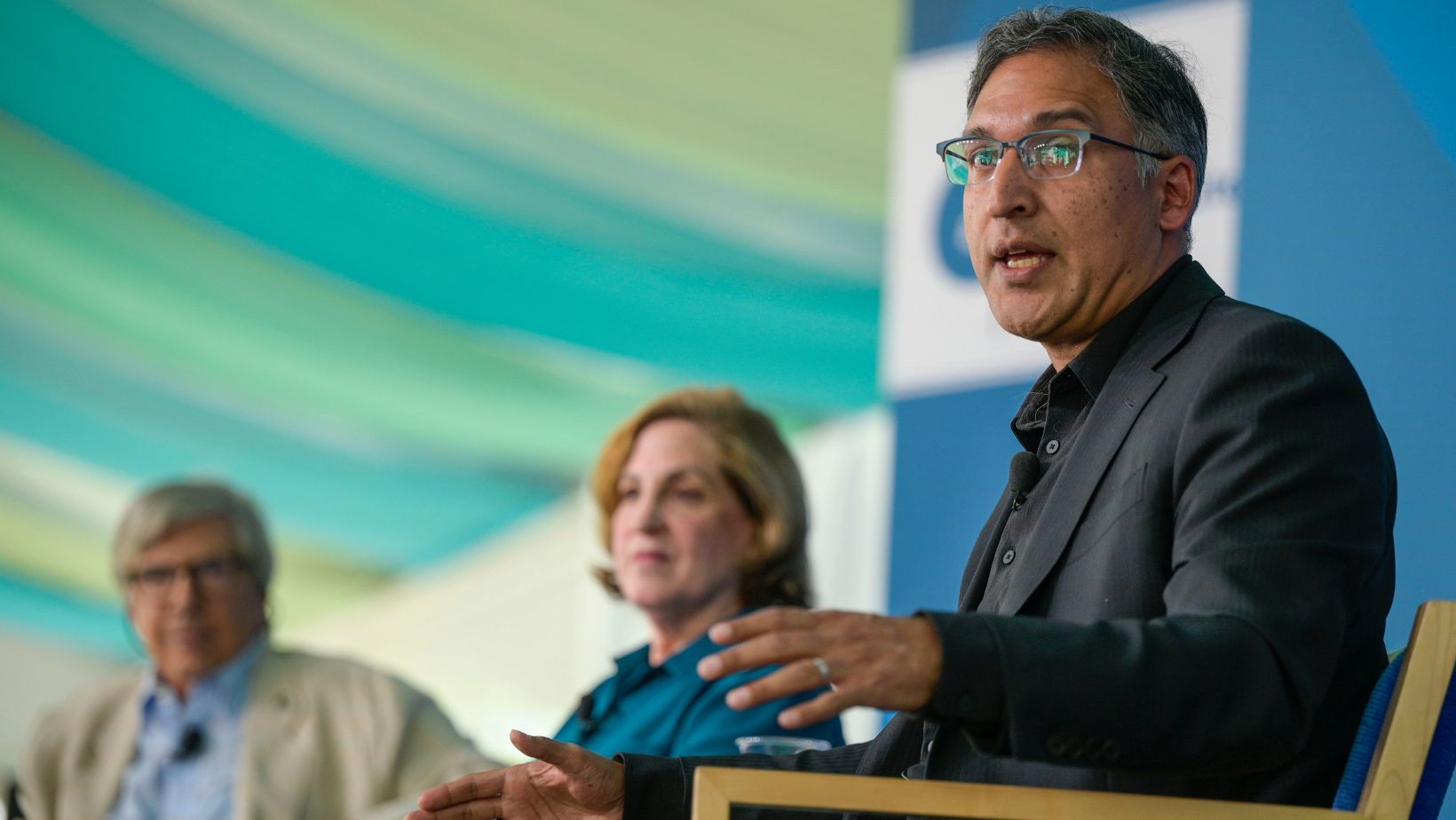Skills training, community colleges, entrepreneurship, and civility were a few of the key issues President Obama spoke about in his State of the Union address last night. We asked some of our experts in these fields and others for their reactions. Their responses are below:
Dan Glickman, executive director of the Aspen Institute Congressional Program, on the lessons about teamwork politicians can take from our military:
The most compelling part of the President’s speech, in my judgment, was his description of the Navy Seals’ mission to take out Bin Laden, and how that mission was totally focused on teamwork and collaboration to get the job done, without regard to background, creed, or party affiliation. His comparison to the need for similar bipartisan teamwork in Washington to get the job done for the American people was striking. If Washington is truly broken, as the President concluded, and needs to fight obstruction with action, as he exhorted Congress, it will take the good faith efforts of both the White House and Congress to repair the vicious cycle of bitterness and lack of civility in our Capitol city, which is tough to do under the best of circumstances, let alone during a Presidential election year.
Josh Wyner, executive director of the College Excellence Program, on the importance of community colleges in creating jobs domestically:
In his State of the Union address, the President rightly pointed to community colleges as an essential part of the solution for creating domestic job opportunities and driving economic growth. Educating 13 million Americans today – or four percent of the entire US population – community colleges have incredible potential to serve as a linchpin between the jobs of the future and the training American workers will need to fill those jobs. About half of the credentials students earn at community college are directly tied to jobs – from nursing to laser technology to welding. To meet national job-training needs, community colleges will need to do even better, improving graduation rates and continuing to make sure that what students learn is tied to the job skills needed tomorrow and in the years to come. The Aspen College Excellence Program has spent the past year investigating which community colleges best achieve those goals and what they did to achieve them, and in December 2011 recognized five community colleges as top finishers in the first annual Aspen Prize for Community College Excellence. To learn more about what makes a community college excel—starting with the top finalist, Valencia College in Orlando, Florida – view our recent publication. We welcome inquiries and comments at aspenccprize@aspeninst.org.
Karen Elzey, director of Skills for America’s Future, on connecting employers with community colleges:
During the State of the Union yesterday evening, President Obama highlighted the importance of partnerships between businesses and community colleges to help improve the skills of America’s workers. This partnership model is the core mission of Skills for America’s Future (SAF), a public-private initiative that is working to connect employers with community colleges to address the current talent mismatch and better train workers for employment. With the announcement of a national commitment to train two million Americans with skills that will lead directly to a job and the promise to give community colleges the resources needed to become “community career centers,” the president showed that the work of SAF will play a central role in reforming how America’s workforce is trained. In just over a year, SAF has successfully helped create or expand partnerships between more than 30 major employers and 200 community colleges across the country, and formed strategic partnerships with major industry associations. SAF is working to reform workforce development in America, and we are excited to have these efforts highlighted.
Anne Mosle, executive director of Ascend, the Family Economic Security Program, on postsecondary education and economic security:
In Tuesday’s State of the Union address, President Obama told the inspiring story of Jackie Bray, a single mother in North Carolina who earned a certificate from Central Piedmont Community College through a partnership with the electronics and engineering company Siemens. The anecdote is a reminder of how important postsecondary education is to the economic stability of our country. At Ascend, we’re highlighting and encouraging innovative programs that help low-income parents, especially parents like Ms. Bray, through a “two-generation” strategy, which focus on creating opportunities for and addressing the needs of parents and children simultaneously. A growing body of research suggests a strong link between a mother’s education and the success of her children, especially when it comes to the school readiness of kindergarten-aged children. Investing in high-quality early childhood education and postsecondary education for both generations of a family is important. With 44 percent of our children living in low-income families, we must look at opportunities that move vulnerable parents and children beyond poverty and toward educational success and economic security together.
Maureen Conway, executive director of the Economic Opportunities Program, on skills training and development for workers:
As I listened to President Obama’s speech last night, I was struck at his commentary on workforce training. It is remarkable to hear a president focus not just on education for the nation’s children and young adults, but also on skills development for the nation’s workers who may be long past their school days, and to paint a picture of what lifelong learning could really mean for our country. Indeed as the population of our country is getting older and people are working longer, investing in current workers is critical, as they are also a large proportion of our future workforce. And yet as I listened, I also wondered where this investment in the American workforce might come from. Mr. Obama held up the terrific example of Siemens, yet few American companies are willing to hire workers and pay them while they are being trained as Siemens did. (Siemens is a German company and the norms are different.) Local and state tax coffers are empty, and federal investments in workforce training are also under pressure, and in general have been on the decline over the past two decades. And working adults, particularly those hoping to get better skills and a better job, just earn too little to cover the costs on their own. Indeed for many of these workers just the opportunity cost of reduced work hours is a significant barrier to pursuing skills training. The President is right that we would all benefit from greater workforce skills. But it will take some tough decisions on investment to make his vision a reality.
Randall Kempner, executive director of the Aspen Network of Development Entrepreneurs, on entrepreneurship and small businesses at home and abroad:
In his State of the Union Address, President Obama laid out a vision for US job creation that begins with entrepreneurship. “Most new jobs are created in start-ups and small businesses. So let’s pass an agenda that helps them succeed,” he exhorted. The president is right— entrepreneurship is the lifeblood of our national economic prosperity. And what’s true for the USA is also the case for emerging markets all around the world. Unfortunately, the president missed a chance to promote entrepreneurship as a tool for global peace and prosperity. If the Arab Spring is to flower into summer, the citizens of Tunisia, Egypt, and hopefully soon, Syria, will need to build sustainable businesses that offer jobs to millions of unemployed youths. The long-term futures of Afghanistan and Iraq also lie in building strong entrepreneurial environments. The administration has actually developed some public-private partnership to promote entrepreneurship; the Global Entrepreneurship Program and Partners for a New Beginning are a couple of examples.
David Monsma, executive director of the Energy and Environment Program, and Jack Riggs, the program’s senior fellow, on US energy policy:
President Obama called attention to very important trends that many Americans may not yet recognize — the declining level of US oil imports and the rapidly increasing production of domestic natural gas. His statements about renewable energy were largely aspirational, but also inspirational. In calling for an “all of the above” energy strategy, he wisely acknowledged our need, at the present time, to take advantage of all fuels. And while disclosing the chemicals used in fracking will not alone safeguard our environment and water, it can help ensure the public support necessary to continue to take advantage of the shale gas boom. Probably the most important recommendation to encourage the use of renewable energy, in addition to passing clean energy tax credits, was his renewed call to create a Clean Energy Standard for electricity. Although it falls far short of what is needed to address climate change and has met opposition in Congress, a clean energy standard would be a powerful incentive for investment in clean energy and energy efficiency.
Clark Ervin, consultant for the Institute’s Homeland Security Program, on the focus, or lack thereof, on security issues:
The President, predictably and understandably, especially in an election year and against a historical backdrop of Democrats being accused of being “soft” on security issues, patted himself (and, of course, the troops) for killing bin Laden and scores of other top terrorists; fulfilling his pledge to withdraw from Iraq; and beginning the draw down in Afghanistan. Then, predictably and understandably, virtually the whole of the rest of the speech focused on the economy. We’ll see, though, whether, predictably, a terror scare or other national security incident re-focuses the national mind on security issues between now and election day. Presidents can pivot and compartmentalize in speeches; it’s not so easy to do so in fact.
Lisa Mensah, executive director of the Initiative on Financial Security, on promoting household savings:
During his State of the Union address, President Barack Obama underscored the need to combat what he described as “the defining issue of our time.” This issue, “the basic American promise that if you worked hard, you could do well enough to raise a family, own a home, send your kids to college, and put a little away for retirement,” identifies core American values that are essential not only for middle-class families’ well-being, but also for our nation’s prosperity. The Aspen Institute Initiative on Financial Security focuses on solutions that promote saving across the lifespan for all American households, and applauds President Obama for acknowledging that this is indeed the key challenge of our time.

